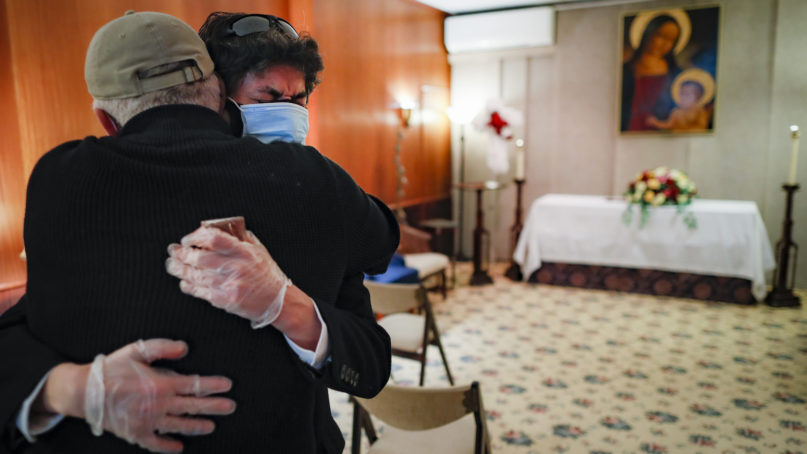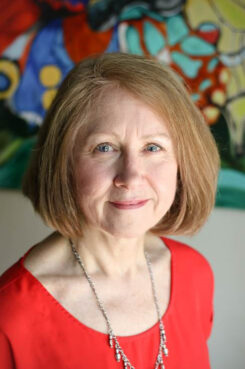(RNS) — Susan Hillis, a member of the COVID-19 International Task Force at the U.S. Centers for Disease Control and Prevention, remembers the phone call she received from a director of a non-governmental organization in Zambia.
The NGO director was fearful for the children in Zambia. So many of them had lost their parents to AIDS and were now being cared for by grandparents. But with COVID-19 taking the lives of the elderly in particular, he worried, who would be left to care for the children?
That’s what led Hillis and other researchers from the CDC — along with the World Health Organization and a number of academic institutions and NGOs — to launch a study to determine how many children had been orphaned by causes related to COVID-19, according to Hillis.
Their report, released last week, estimated more than 1.5 million children around the world lost a parent or grandparent who lived with and cared for them in the first 14 months of the pandemic.
“We began to realize this is really a hidden pandemic no one has measured and no one is advocating for,” said Hillis, who has a PhD. in epidemiology and whose work addresses HIV/AIDS, violence prevention and orphaned and vulnerable children.
Hillis, who also coordinates faith and community initiatives for the CDC, describes herself as a Christian and regularly spends her time off volunteering around the globe with faith-based organizations. That includes collaborating with Pastor Rick and Kay Warren of Saddleback Church in California to address those orphaned in the countries most impacted by the HIV/AIDS epidemic.
She spoke with Religion News Service about how her Christian faith connects with her work for the CDC and how people of all faiths can support children and families devastated by the COVID-19 pandemic. This interview has been edited for length and clarity.
Can you talk a bit about your faith and how it informs your work?
I would say my Christian faith is the singular driving, motivating, sustaining and rewarding value that drives my service at home, at CDC and also globally.
I do think faith undergirds a lot of values that are important and relevant for the kind of work we do at CDC: compassion, excellence, humility and collaboration. I think anyone with authentic faith has a similar kind of dedication to addressing disparities, inequities and areas of extreme need. What we would probably say, in a faith vernacular, is paying attention to what Jesus talks about in Matthew as “the least of these” in terms of where there is extreme need.
Can you help put the numbers in this report into perspective for readers?
What we found was staggering. Between March 1, 2020, and April 30, 2021, we found that the roughly 3 million deaths had left behind 1.5 million children who were either orphaned or had experienced the death of a grandmother or grandfather who lived with them and helped provide their care. Basically, it was that same group this NGO director was so worried about. What he was worried about was happening.
There are two very simple ways to think about it that almost everyone can wrap their heads around. One is simply for every two reported COVID deaths, there is one child left behind. By a little over 3 million deaths, there have been 1.5 million children who have been affected. So it’s basically a 2-to-1 ratio in almost any country. Every two COVID deaths leaves behind one child who is affected by the death of a mother or father or grandmother or grandfather who lives in their home and helps provide their care, which is really heartbreaking and has serious long-term consequences.
Another easy way to think about it is every 12 seconds, one child is either orphaned or loses a caregiver due to COVID-19. So by the time you basically count to 12, another child has had a parent die in the world.
Those were the numbers by the end of April. That rate has continued relatively stable in April, May and June and even into July. We had hoped as the vaccine uptake increases, those numbers would go down. I think eventually they will, but right now, we don’t have adequate vaccine coverage globally to really make those numbers quickly go down.
RELATED: In many COVID hot spots, a pattern: High concentrations of white evangelicals
Not only is this heartbreaking, as you said, but what kind of risks does this pose to these children?
There are both immediate, short-term, serious threats to children’s health and wellbeing and there are lifelong threats to children’s health and wellbeing because orphanhood doesn’t go away. You can get COVID, and most people actually do recover from it and heal from it — we know some don’t, and that’s really what brought this whole study about — but once a child has experienced the death of their mother and is a maternal orphan, that status does not change for all of their childhood.
Short term, there are increased risks of mental health problems, including anxiety, depression, post traumatic stress disorder, as well as serious economic problems and serious threats to being able to stay in school that are often linked to the economic problems. Often, there are additional threats of domestic violence and physical, sexual and emotional abuse.
That constellation of short-term risks together comprises what we call at CDC and as scientists “adverse childhood experiences,” and multiple combinations of those increase your lifelong risk of chronic diseases, including heart disease and specific kinds of cardiovascular diseases, including heart attack, diabetes, cancer and serious chronic lung problems. In fact, they increase every major cause of death in the world.
We have a three-fold strategy for solutions called “prevent, prepare, protect.” The very first thing we need to actively do is aggressively promote equitable distribution of vaccines around the world. Because if, in fact, we can achieve widespread herd immunity in every country that’s having COVID-associated orphanhood consequences, we can actually prevent that before it even happens, which is what we would most want to do.
While we wait — because in many countries, there isn’t the vaccine access we would like — we know what works for mitigation. We can all say it: distancing, masking and making sure we maintain proper hand hygiene. Particularly for people in faith environments, it’s being careful to avoid mass gatherings and congregating in large groups when the numbers of transmissions in a community or in a state or in a nation are high. So that’s what we need to do on the “prevent” side.
The report stresses that institutions such as orphanages are not the best way to care for these children. Can you talk about why that is and what some better solutions for children and their families might be?
On the “prepare” side, we need to really rapidly collaborate between governments and faith networks, particularly, and other community networks to prepare and equip families to provide kinship care if, in fact, one of the parents dies and there’s a need for additional support inside the family. If there is not a kinship option available, either foster care or adoptive care is the next best option for children.
The reason we need to actively avoid orphanages and support family-based care instead is multiple studies — as many as 75 studies from 25 countries —demonstrate there are enduring negative developmental and cognitive effects on children who grow up in an orphanage or institution. In fact, for every one year in an institution, there’s a three-month delay in development. Additionally, there are limitations in the child’s ability to develop attachments and socioemotional skills. So for that reason, science would emphasize children need to live in safe and loving families.
RELATED: Franklin Graham urges evangelicals to get vaccinated before it’s ‘too late’
What are some things people of faith can do to support these children and their families?
We talked about “prepare,” and we talked about “prevent,” but the third strategy we’re really emphasizing is “protect.” How can we protect those children who remain with maybe a single caregiver in their family from the increased risks of violence, abuse, neglect, exploitation and other aspects of social vulnerability, including economic limitations or poverty?
One of the main things the faith community has is access and trust. So just think: whenever a parent or caregiver dies, often there will be some type of memorial service. It would be natural for the faith leader to begin to identify: are there children in the home and do they need help? So, for the faith community themselves to collaborate with the child protection community in the particular area where the family who is in need lives and begin to reach out and try to visit and help serve in practical ways the family who is bereaved and recovering. Faith communities are really good at doing this, walking with people through adversity until they get out the other side.
Also, certainly, making sure children can stay in school. Sometimes children have fees or backpacks or notebooks they need — small contributions that strengthen a child’s ability to stay in school, small contributions that strengthen the ability of the parents in the home to actually continue doing the parenting needed and even small contributions that might help economically if suddenly the family finds themselves strapped because the main caregiver has died. Most every faith community I know has a benevolence fund across many different faith platforms, and they can also help ensure children have what they need to stay in school.






